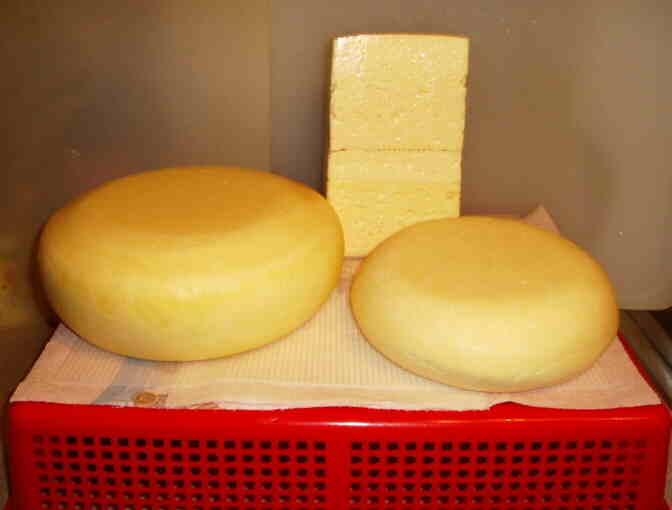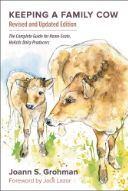Post by deejaydebi on Aug 18, 2009 21:46:50 GMT -5
This was a great cheese making weekend!
The bigger wheel is the Manchego and the small wheel and the square cheese is the Muenster.

Both can be eatten after only about a month or two so they are another couple of quick cheese you can enjoy.
![]()
Ingredients:
1 gallon whole Milk.
1/4 teaspoon Mesophilic Type B Culture (CHOOZIT™ Mesophilic Aromatic Type B)
1/4 teaspoon Thermophilic Type B Culture (CHOOZIT™ TM 81)
1/4 teaspoon Lipase Powder
Rennet per manufacturers instructions
Salt for brine
Olive Oil
1/2 teaspoon Calcium Chloride (if using pasturized milk)
Procedure:
Heat milk to 86°F.
Add calcium chloride if needed and sir well.
Add Mesophilic and Thermophilic culture and mix well and leave for 45 minutes.
Mix the lipase powder in 1/4 cup water and let stand for 20 minutes.
Add lipase mixture to the milk and stir gently for 1 minute.
Mix Rennet per manufactures instruction in 1/4 cup of pure water and add to the milk and mix completely.
Once a clean break is achieved cut curds to about 1/2 inch cubes and rest for 5 minutes.
Whisk the curds into rice-size pieces.
Heat the curds to 104°F at a rate of 2°F every five minutes. This will take about 45 minutes. Stir occasionaly to keep curds from matting together.
Rest curds for 5 minutes.
Pour off excess whey.
Drain curds in cheese cloth line collander.
Place curds into a mold, and press with 15 pounds pressure for 15 minutes.
Flip the cheese and press again with 15 pounds pressure for 15 minutes
Flip the cheese and press again with 15 pounds pressure for 15 minutes
Flip the cheese and press again with 30 pounds pressure for 6 hours.
Unwrap cheese and soak medium brine for 6 hours at 50-55°F turning every hour.
Remove cheese from mold and air dry at 50-55° F with a relative humidity of 80-85%.
Turn cheese every day for about a week.
Cheese should age for 1 month or longer.
Rub with olive oil to keep rind from drying out.
Muenster cheese
Ingredients:
4 gallon whole Cow Milk
1/4 teaspoon Probat 222 or Mesophile Aromatic Type B
Optional: Calcium Chloride if using store bought pasterurized milk.
Rennet, amount as per package directions or your experience.
1/4 teaspoon of Brevibacterium Linens.
1/4 teaspoon Geo cadium
Salt for brine.
Procedure:
Warm to 90° F stiring gently. Turn off heat.
Sprinle culture over milk. Mix using up and down strokes. Let sit for 5 minutes.
If using store bought milk then dissolve the calcium chloride in 1/4 cup pure water and mix well.
Mix the rennet in 1/4 cup pure water and stir into milk for 1 minute. cover and set aside at same temperature for 45 minutes or until get good curd break.
Leave for 40 minutes covered maintaining 90° or until a clean break is achieved.
Cut the curds into 1/2 inch pieces, cover, settle curds and maintain temperature for 30 minutes.
*Strain curds in cheesecloth lined collander for 10 minutes then carefully laddle curds into molds. The curds are very soft and delicate at this stage! **
Cover - avoid drafts and drain for 24 hours, gently flipping cheeses several times.
If curds are still to soft to handle after 24 hours wait another 5 or 6 hours
Remove from molds and sprinkle each side with 1/4 teaspoon of salt then place on mat in a ripening container at 55°F and 85% humidity.
Turn cheeses daily, remove whey for about 3 days or until no more whey is released.
**Wash cheeses every other day with cloth dipped in brine mix of 1 cup water, 2 teaspoons of salt B. Linens and Geo Candium.
After about 10 days an orange smear will appear. Continue to wash cheeses every other day for at least 2 weeks for small cheeses and 3 weeks for large cheeses.
Ripen for up to 3 months.
* After draining curdsfor 5 minutes try adding cooled boiled cumin seeds over the curds mixing in gently.
** Cheese may be washed in 1 teaspoon salt anf 1 cup of Alsatiam white wine.
The bigger wheel is the Manchego and the small wheel and the square cheese is the Muenster.

Both can be eatten after only about a month or two so they are another couple of quick cheese you can enjoy.
Ingredients:
1 gallon whole Milk.
1/4 teaspoon Mesophilic Type B Culture (CHOOZIT™ Mesophilic Aromatic Type B)
1/4 teaspoon Thermophilic Type B Culture (CHOOZIT™ TM 81)
1/4 teaspoon Lipase Powder
Rennet per manufacturers instructions
Salt for brine
Olive Oil
1/2 teaspoon Calcium Chloride (if using pasturized milk)
Procedure:
Heat milk to 86°F.
Add calcium chloride if needed and sir well.
Add Mesophilic and Thermophilic culture and mix well and leave for 45 minutes.
Mix the lipase powder in 1/4 cup water and let stand for 20 minutes.
Add lipase mixture to the milk and stir gently for 1 minute.
Mix Rennet per manufactures instruction in 1/4 cup of pure water and add to the milk and mix completely.
Once a clean break is achieved cut curds to about 1/2 inch cubes and rest for 5 minutes.
Whisk the curds into rice-size pieces.
Heat the curds to 104°F at a rate of 2°F every five minutes. This will take about 45 minutes. Stir occasionaly to keep curds from matting together.
Rest curds for 5 minutes.
Pour off excess whey.
Drain curds in cheese cloth line collander.
Place curds into a mold, and press with 15 pounds pressure for 15 minutes.
Flip the cheese and press again with 15 pounds pressure for 15 minutes
Flip the cheese and press again with 15 pounds pressure for 15 minutes
Flip the cheese and press again with 30 pounds pressure for 6 hours.
Unwrap cheese and soak medium brine for 6 hours at 50-55°F turning every hour.
Remove cheese from mold and air dry at 50-55° F with a relative humidity of 80-85%.
Turn cheese every day for about a week.
Cheese should age for 1 month or longer.
Rub with olive oil to keep rind from drying out.
Muenster cheese
Ingredients:
4 gallon whole Cow Milk
1/4 teaspoon Probat 222 or Mesophile Aromatic Type B
Optional: Calcium Chloride if using store bought pasterurized milk.
Rennet, amount as per package directions or your experience.
1/4 teaspoon of Brevibacterium Linens.
1/4 teaspoon Geo cadium
Salt for brine.
Procedure:
Warm to 90° F stiring gently. Turn off heat.
Sprinle culture over milk. Mix using up and down strokes. Let sit for 5 minutes.
If using store bought milk then dissolve the calcium chloride in 1/4 cup pure water and mix well.
Mix the rennet in 1/4 cup pure water and stir into milk for 1 minute. cover and set aside at same temperature for 45 minutes or until get good curd break.
Leave for 40 minutes covered maintaining 90° or until a clean break is achieved.
Cut the curds into 1/2 inch pieces, cover, settle curds and maintain temperature for 30 minutes.
*Strain curds in cheesecloth lined collander for 10 minutes then carefully laddle curds into molds. The curds are very soft and delicate at this stage! **
Cover - avoid drafts and drain for 24 hours, gently flipping cheeses several times.
If curds are still to soft to handle after 24 hours wait another 5 or 6 hours
Remove from molds and sprinkle each side with 1/4 teaspoon of salt then place on mat in a ripening container at 55°F and 85% humidity.
Turn cheeses daily, remove whey for about 3 days or until no more whey is released.
**Wash cheeses every other day with cloth dipped in brine mix of 1 cup water, 2 teaspoons of salt B. Linens and Geo Candium.
After about 10 days an orange smear will appear. Continue to wash cheeses every other day for at least 2 weeks for small cheeses and 3 weeks for large cheeses.
Ripen for up to 3 months.
* After draining curdsfor 5 minutes try adding cooled boiled cumin seeds over the curds mixing in gently.
** Cheese may be washed in 1 teaspoon salt anf 1 cup of Alsatiam white wine.





